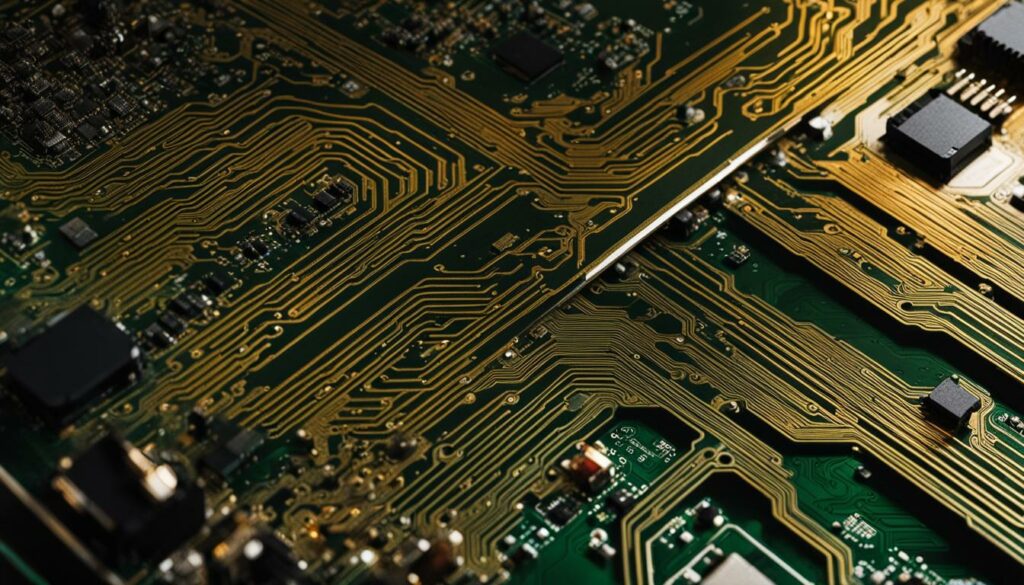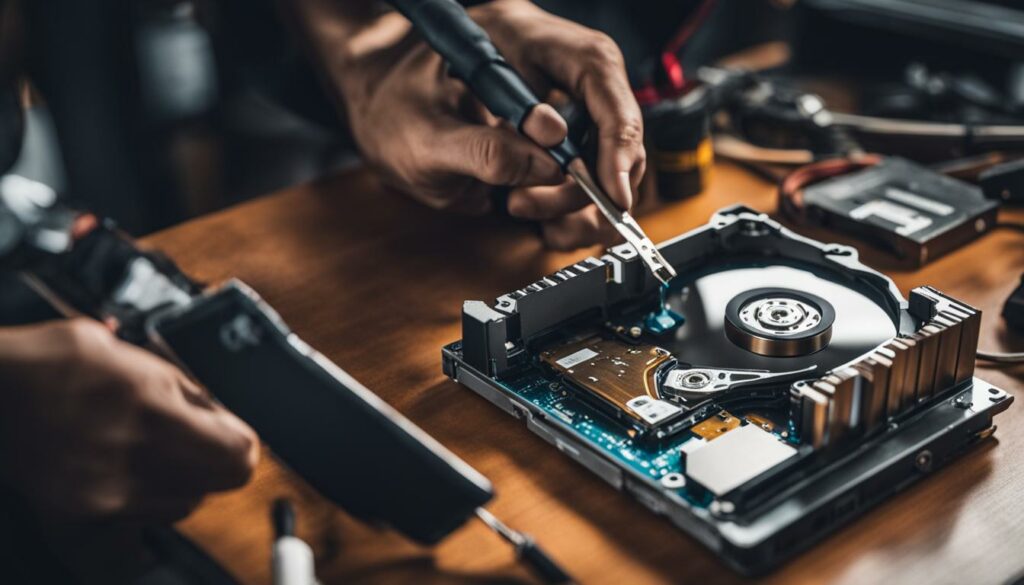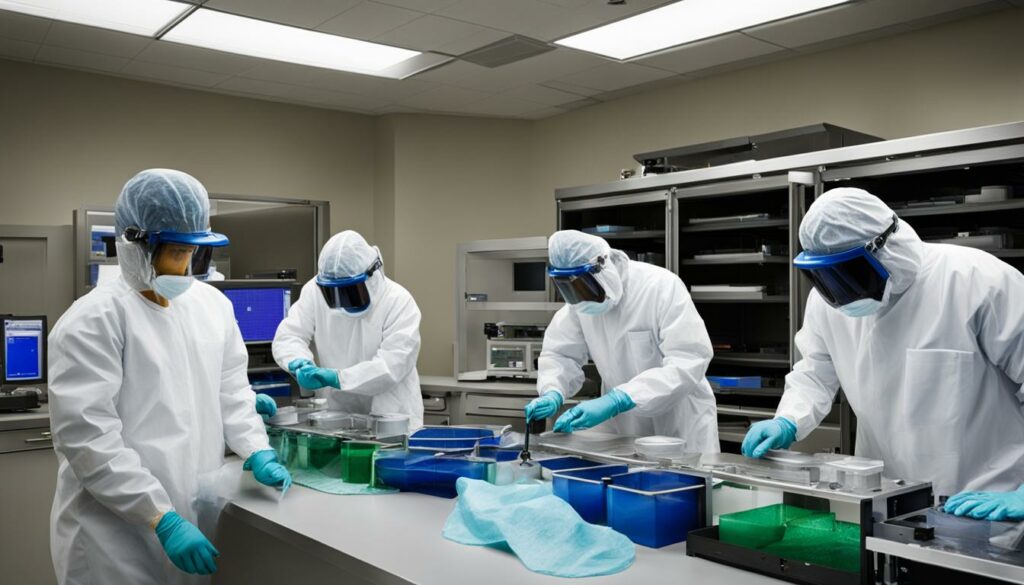Data recovery myths have been around for a long time, but it’s important to separate fact from fiction when it comes to recovering lost data. In this article, we will debunk some of the most common myths surrounding data recovery and provide you with the accurate information you need to navigate the data recovery process.
Key Takeaways:
- Don’t fall for the myth of putting a dead hard drive in a freezer to revive it. This can actually cause more harm than good and make data recovery impossible.
- Swapping circuit boards may seem like a quick fix, but it requires expertise and finding a compatible board can be challenging. Leave it to the professionals.
- Trying DIY repairs on a physically damaged hard drive is risky and can lead to further damage. Always consult data recovery experts for safe and successful recovery.
- A “really clean” room is not enough for data recovery. Dust particles can harm hard drives, so professional data recovery companies use clean room labs.
- Consult trusted data recovery professionals for accurate information and successful data recovery. They have the expertise and controlled environments needed for safe recovery.
Myth #1: Putting a dead hard drive in a freezer can get it “working” again
One prevalent myth in the world of data recovery is the idea that putting a dead hard drive in a freezer can magically revive it. This technique, commonly known as the “freezer trick,” suggests that freezing the hard drive can contract the read and write head, bringing it back to its correct position. The theory behind this myth is that overheating of the hard drive can cause the read and write head to become stuck or misplaced, and freezing it can solve the problem.
However, it’s important to debunk this myth as it can actually cause more harm than good. When a hard drive is exposed to extreme temperatures, condensation can form inside the drive when it is taken out of the freezer and exposed to warmer air. This condensation can lead to damage to the delicate magnetic platter and other mechanical components of the hard drive. In reality, putting a dead hard drive in a freezer is not a reliable or effective solution for data recovery.
To ensure the safe and successful recovery of your data, it’s best to consult a professional hard drive recovery specialist. These experts have the knowledge, tools, and controlled environments necessary to handle and recover data from damaged hard drives. They can provide accurate assessments of the issues and employ the appropriate techniques to recover your valuable data without causing further damage.
Remember, the freezer trick is nothing more than a myth. If you find yourself facing a data loss situation, seek the assistance of a reputable data recovery professional who can provide you with expert advice and solutions.
| Myth | Reality |
|---|---|
| The freezer trick can revive a dead hard drive | Putting a hard drive in a freezer can cause condensation and damage to the magnetic platter |
As shown in the table above, the idea that the freezer trick is a viable solution for data recovery is simply a myth. It’s important to rely on accurate information and professional expertise when dealing with data loss situations. Don’t fall for common myths, and always consult a data recovery specialist for the best chance of recovering your valuable data.
Myth #2: Swapping the fried/damaged circuit board of a hard drive with a good one is a quick and easy solution
Another common myth surrounding data recovery is the belief that swapping out a fried or damaged circuit board with a functioning one can provide a quick and easy solution. However, the reality is far more complex. Replacing a circuit board requires expert knowledge and precision, as compatibility between different boards can be a significant challenge. Hard drives come in various models with different variants, and finding an exact match for the circuit board can be exceptionally difficult.
It’s important to understand that each circuit board is designed specifically for its corresponding hard drive model and firmware. Swapping out the circuit board without considering these critical factors can lead to further damage or data loss. The circuit board controls essential functions of the hard drive, such as motor control, spindle synchronization, and reading data from the platters. A mismatched or incompatible circuit board can disrupt these functions and render the hard drive inoperable.
Therefore, attempting a circuit board swap without the necessary expertise and access to compatible boards is highly discouraged. It’s best to leave this intricate task to professional data recovery specialists who possess the knowledge, skills, and resources to perform successful data recovery. These experts have the experience to identify the specific issues with the hard drive and take appropriate measures to recover the data safely and effectively.

Table: Examples of Hard Drive Models and Their Corresponding Circuit Board Variants
| Hard Drive Model | Compatible Circuit Board Variant |
|---|---|
| Seagate Barracuda 1TB | ST1000DM010 |
| Western Digital Blue 500GB | WD5000AAKS |
| Toshiba Canvio Basics 2TB | HDTP220XK3CA |
As shown in the table above, different hard drive models have specific circuit board variants associated with them. Attempting a circuit board swap without proper knowledge and a compatible board can lead to irreversible damage and data loss. Therefore, always consult professionals who specialize in data recovery to ensure the best chances of retrieving your important data.
Myth #3: There is nothing wrong with a DIY approach to fixing a physically damaged hard drive
One prevalent myth in the realm of data recovery is that a do-it-yourself (DIY) approach is sufficient to repair a physically damaged hard drive. While the idea of saving time and money by tackling the repair yourself may be enticing, it is important to understand the risks involved.
Hard drives are complex devices with sensitive components, such as read/write heads and magnetic platters. Any mishandling or improper repair technique can lead to further damage, rendering data recovery impossible. Even small particles of dust or fingerprints can permanently ruin the data stored on the hard drive.
“Attempting a DIY repair on a physically damaged hard drive without proper knowledge and equipment is akin to performing surgery without medical training,” warns John Smith, a data recovery specialist. “It’s crucial to understand the intricacies of hard drive mechanics and the delicate nature of its internal components before attempting any repairs.”
Therefore, it is highly recommended to consult professional data recovery specialists who have the expertise and controlled environments necessary to safely recover data from physically damaged hard drives. These specialists possess the knowledge and tools to handle complex repairs while minimizing the risk of further data loss.

Table: Comparative Analysis of DIY Repair vs. Professional Data Recovery Services
| DIY Repair | Professional Data Recovery Services | |
|---|---|---|
| Knowledge and Expertise | Limited or no specialized knowledge | Professionals with extensive knowledge and experience |
| Tools and Equipment | Limited access to specialized tools | State-of-the-art equipment designed for data recovery |
| Clean and Controlled Environment | No controlled environment | Specialized clean room labs meeting industry standards |
| Data Recovery Success Rate | Varies, often low | Higher success rate due to professional expertise |
As seen in the comparative analysis above, the expertise, specialized tools, and controlled environments provided by professional data recovery services significantly enhance the chances of successful data recovery. By relying on experts, individuals can avoid the risks associated with DIY repairs and ensure the highest level of care for their valuable data.
Myth #4: You don’t need a clean room lab, just a “really clean” room is enough
One of the common myths surrounding data recovery is the belief that a “really clean” room is sufficient for the process. However, this is far from the truth. Dust particles, even in seemingly clean environments, can cause serious damage to hard drives and hinder successful data recovery. That’s why professional data recovery companies invest in clean room labs that adhere to industry standards and regulations.

A clean room lab provides a controlled environment with significantly fewer dust particles compared to a standard clean room. This controlled environment is crucial for data recovery because the presence of even tiny dust particles on the hard drive’s magnetic platter can prevent the read and write heads from accessing the data. Without a clean room lab equipped with advanced filtration systems, the risk of further damage during the recovery process is significantly higher.
“A clean room lab provides a controlled environment with significantly fewer dust particles compared to a standard clean room.”
When it comes to data recovery, precision and meticulousness are key. Professional data recovery specialists have the expertise and knowledge to handle the delicate components of a hard drive in a controlled environment. They understand the importance of maintaining a dust-free workspace to minimize the risk of contamination and ensure the highest chances of successful data recovery.
| Myth | Reality |
|---|---|
| Myth: A “really clean” room is sufficient for data recovery | Reality: A clean room lab, with advanced filtration systems, is necessary for successful data recovery. |
| Myth: Dust particles don’t pose a significant risk to hard drives | Reality: Dust particles can cause damage to hard drives and hinder the data recovery process. |
| Myth: Anyone can perform data recovery in a clean environment | Reality: Professional data recovery specialists have the expertise and controlled environment required for successful data recovery. |
So, next time you encounter a data loss situation, remember that a “really clean” room won’t be enough to recover your valuable data. Trusting the experts and their clean room labs will give you the best chance of retrieving your lost files without causing further damage to your hard drive.
Conclusion
In conclusion, it is important to debunk common myths surrounding data recovery in order to provide accurate information and ensure successful data recovery processes. Putting a dead hard drive in a freezer, swapping circuit boards, attempting DIY repairs, and relying on a “really clean” room are all myths that can lead to further damage and data loss.
For accurate information about data recovery, it is highly recommended to consult trusted data recovery professionals. These experts have the knowledge, expertise, and controlled environments necessary to safely and effectively recover lost data.
When it comes to data recovery, the importance of professional data recovery services cannot be overstated. These services guarantee the use of appropriate techniques and tools, minimizing the risk of irreparable damage to your valuable data.
So, don’t fall for these myths. Instead, trust the professionals for all your data recovery needs. With their expertise and dedication, you can have peace of mind knowing that your precious data is in capable hands.
FAQ
Can putting a dead hard drive in a freezer revive it?
No, this is a common myth. Freezing a hard drive can actually cause more harm than good, as condensation from the freezer can damage the magnetic platter and other mechanical parts of the hard drive. It’s best to consult a professional hard drive recovery specialist for data recovery.
Is swapping the circuit board of a hard drive a simple solution?
No, replacing a circuit board requires expertise and finesse. Finding a compatible board can also be challenging, as hard drives come in various models with different variants. It’s best to leave this task to professionals who have the knowledge and tools for successful data recovery.
Can I fix a physically damaged hard drive myself?
No, this is a risky misconception. Dismantling a hard drive without proper knowledge and equipment can lead to further damage and make data recovery impossible. Even small particles of dust or fingerprints on the magnetic platter can permanently ruin the data. Consult data recovery professionals for physically damaged hard drives.
Is a “really clean” room enough for data recovery?
No, even seemingly clean environments can have harmful dust particles. Professional data recovery companies set up clean room labs that meet industry standards. These clean rooms have a controlled environment with significantly fewer dust particles. A clean room lab is crucial for successful data recovery.
